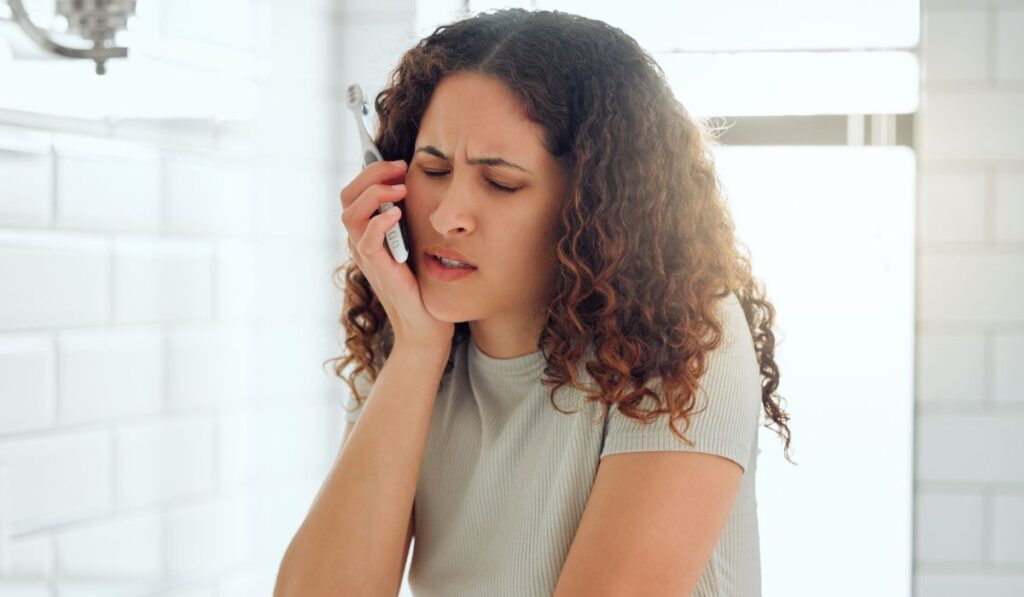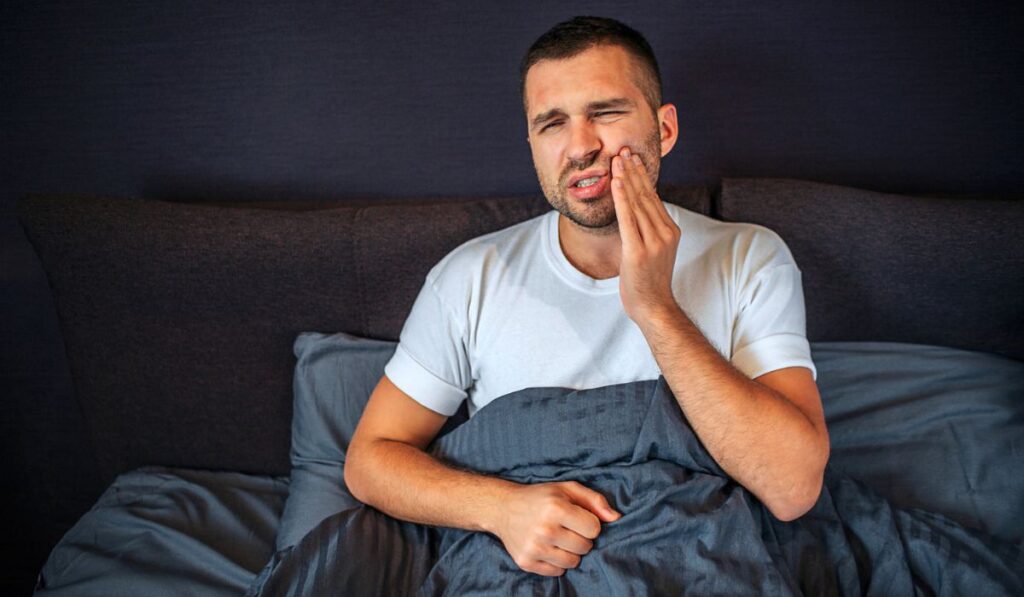There are many reasons you may be experiencing tooth pain in the mornings. These reasons can vary from a simple correction of how you sleep, to something far more sinister which may require the treatment of a dentist. Knowing why your teeth hurt is a tricky thing to navigate and can take some trial and error to pinpoint the exact cause.
Tooth pain in the morning is common but not normal. It can be caused by a number of reasons such as pressure buildup, disease, eating habits or cavities. If you have Bruxism, then you can negate some pain by having a routine sleeping schedule, making healthier choices, and visiting the dentist.
Tooth pain in the morning is a common complaint that people have. However, that doesn’t make it something you just have to live with. Let’s look at some of the most common causes of tooth pain in the mornings and the remedies that may solve your tooth pain problems.
Is It Normal for Your Teeth to Hurt After Waking Up?

Waking up with your teeth aching is rather common, but it is not normal and should be addressed. Unfortunately, there is no single reason why your teeth might be hurting. Figuring out the cause for sore teeth in the morning is the first step into dealing with the issue and waking up pain free.
Bruxism
Bruxism, also known as teeth grinding and clenching, is one of the most common causes of tooth pain in the morning. Typically speaking, most people don’t know they have bruxism, since it occurs when you are sleeping.
That being said, a dentist will see signs that clenching and/or grinding is occurring on the surface of your teeth and gums, since clenching exerts immense pressure on your teeth and wears down the dental enamel.
Sinus Infection
Your sinuses are located just above your teeth so having a sinus infection can cause your teeth to hurt. When you sleep, your sinuses fill with fluids that can then create pressure. This then places more pressure on your upper teeth, which in turn, makes them painful when you wake up.
The difference between sinus infection pressure build up and other reasons why your teeth might be hurting in the morning, is the fact that with sinus pressure, it will never be just a single tooth that aches. It will always be a general area with the inability to pinpoint exactly where it hurts.
Gum Disease
Periodontal disease, or more commonly known as gum disease, happens when plaque and tartar build up along your teeth. This build up starts to then irritate the gums, and gradually it will cause them to recede and expose the nerve endings.
If you have severe gum disease you will notice discomfort in your mouth throughout the day, and at night, when you relax, it will only get worse. The intensity of the pain may also increase in the morning when you wake up.
Pregnancy
Tooth pain isn’t usually seen as a pregnancy symptom but it definitely is. With the hormonal changes that occur during pregnancy, this can increase your risk of gum disease and lead to tooth pain. So it is always a good idea to take extra care of your teeth while you are pregnant and visit the dentist regularly.
Sleeping Position
If your pain is focused on a specific area and disappears quickly once you get up in the morning, then it could mean that nothing is actually wrong with your teeth and it’s just the position you sleep in.
A good example of this is if you sleep with your hand under your head. That extra pressure from your hand can cause pain to accumulate against your teeth and jaw. It could also keep your jaw at an odd angle instead of in the natural resting position.
Overusing Mouthwash
Too much of anything is never a good thing. The same goes with mouthwash. Overdoing the usage, quantity and frequency recommended on the bottle can lead to sensitivity and in turn, tooth pain once you wake up in the morning.
Trigeminal Neuralgia (Nerve Damage)
The trigeminal nerve starts near the top of your ear and splits into three branches that go toward your eye, cheek and jaw on each side of your face.
Damage to this nerve, known as Trigeminal Neuralgia can be felt in tooth pain. Generally you will feel it on one side of the face and some people describe it as severe jabbing sensations or spasms.
Dehydration
It’s well known that drinking enough water throughout the day is good for your overall health, but what most people don’t realize is that it translates to your teeth as well. Drinking water helps wash away food residue and bacteria, as well as decreases the risk of gum disease with a hydrated mouth.
If you wake up with a dry mouth and tooth pain then increasing your water throughout the day can make a huge difference.
Stomach Acid and Vomiting
High stomach acid levels and health conditions that cause regular vomiting like gastroesophageal disease or morning sickness in pregnancy, can lead to an erosion of tooth enamel. Having that withered away protection for your teeth can lead to both sensitivity and pain.
Acidic Foods
Much like high stomach acid levels, consuming lots of acidic foods can affect your teeth. Soda, citrus and other acidic foods can eat away at your tooth enamel and lead to both nerve damage and tooth sensitivity. Cut back on eating these kinds of food and don’t consume them before bed or after brushing your teeth for the night.
Temporomandibular Joints Disorder
Your Temporomandibular joints are two joints on either side of your face that connect your lower jaw to your skull. They allow you to both open your mouth and chew your food. TMJ, or Temporomandibular Joints Disorder is when those joints become inflamed and irritated, causing pain in your teeth, jaw, neck, ear and face.
Cavities
Cavities are a common cause of tooth pain, and when left untreated they can create an achy pain or even an intense, sharp sensation in your teeth that can occur at any time. An untreated cavity can even cause you enough pain to wake you up in the middle of the night.
Impacted Tooth
Wisdom teeth come later in life and many time they come in impacted, without the individual even realizing there is a tooth there. If you are waking up with red, swollen and painful gums just behind your molars, along with dull, achy or sharp pain, then you are most likely experiencing an impacted wisdom tooth. The best course of action is to visit your dentist.
Tooth Abscess
Leaving a decaying tooth untreated can lead to a bacterial infection within said tooth or gums. This creates a pocket of pus which is known as an abscess. That abscess can cause intense, throbbing pain and sometimes you can even see that abscess around the gumline, though that isn’t always the case.
How Do You Stop Bruxism While Sleeping?

Bruxism occurs a lot of the time without you even knowing. It is the clenching or grinding of your teeth while you sleep, so not realizing you are doing this isn’t unheard of. Fortunately, there are a number of things you can do to stop or alleviate Bruxism, if you suspect you have it.
- Find a way to relax before bed, either by breathing exercises, listening to music or physical activity.
- Go to sleep at the same time every night and make sure you are relaxed before doing so. Your bedroom should be quiet and dark to allow optimal sleeping habits.
- Try to take painkillers like paracetamol or ibuprofen if your jaw is painful or swollen.
- Use an ice pack wrapped in a tea towel for 20 to 30 minutes to help reduce that jaw pain or swelling.
- Don’t smoke, drink alcohol or take drugs such as ecstasy and cocaine.
- Avoid chewing gum or hard foods if your jaw or teeth are hurting.
- Visit the dentist regularly, as they will be able to notice signs of Bruxism on your teeth and can suggest a mouthguard to help.


